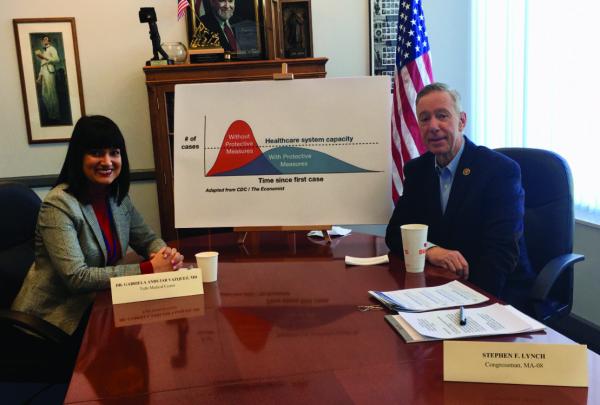March 20, 2020

Congressman Stephen Lynch, right, discussed the spread of COVID-19 with epidemiologist Dr. Gabriela Andujar Vasquez in a livestream on Monday.
Congressman Stephen Lynch on Monday hosted a live stream discussion about the COVID-19 with Dr. Gabriela Andujar Vazquez, an epidemiologist who specializes in infectious diseases and infection control at Tufts Medical Center.
The livestream followed the issuance of state and city guidelines meant to help prevent the spread of the coronavirus that Lynch called “among the most aggressive in the country.”
The exchange between the doctor and the congressman and their questioners follows:
Q. Will wearing face masks work to stop the spread of covid-19?
A. Face masks work when they are used by a symptomatic person. When we are out in the public, the most important thing that we need to employ is hand hygiene. People that are not sick and are not presenting with symptoms need to wash their hands. To expose anyone to the disease, they have to be in contact with someone who is presenting with the symptoms. Those symptoms are fever, sore throat, cough, and shortness of breath.
Q. If I get the virus and recover, will I have an immunity to that virus?
A. This virus is new and we think that you would have some immunity; there is some protection there. We don’t know yet how long that protection could last and there’s still a lot to be known.
Q. What if someone who gets coronavirus has to self-isolate and doesn’t have sick leave?
A. (Lynch): We’ve passed bills addressing the crisis. One is the Family First Bill that secured $8.3 billion and provides for a number of protections for people whether or not they have insurance. We’ve also secured paid family leave up to three weeks for those who have to miss work. If you can't afford the doctor, you’ll be covered under the legislation, it’s a blanket provision.
Q. Are medical professionals working on a vaccine or treatment for the coronavirus?
A. At this time, there is no cure and no particular treatment. All of the tested treatments are in the clinical trial stage and being monitored by the CDC.
Q. What are the chances that Boston could enter a state of lock down and how do we avoid this?
A. (Lynch) I don't think we are at that stage now. We don't have that flare-up in Boston. This would be high speculation at this point, but it’s important that we do address the possibility. Everything is on the table if the situation were to present itself at that level, including lockdown. What we now do to prevent the spreading of the coronavirus, including minimizing the number of people gathering, and practicing social distancing and good personal hygiene will reduce the spread.
Vazquez: Hospitals are definitely prepared to handle the number of cases we have now. The hospitals in Mass. have had pandemic plans put in place for many years and pandemic responsiveness is something we have processes in place for. We do track, in real time, how it's evolving and when it’s deemed to be a pandemic, we make sure we have a plan for every scenario including an influx of patients.
Q. How is a test actually done?
A. The test is a simple nasal swab in each nostril.It’s the same procedure as the test that is used for other viruses. It typically takes 4 to 7 days to come back, but we are prioritizing people that have severe illnesses, or those who are healthcare workers to make sure that they’re not exposed to patients.
Q. What does “flatten the curve” actually mean?
A. Protective measures flatten the curve and allow the health care system to handle cases slowly. If we don’t take the recommended protective measures, the number of cases will multiply dramatically and that will overwhelm the system.
Q. If someone gets sick, is it best to stay at home and let the virus run its course unless there are serious symptoms?
A. Yes, stay home. We want people to seek medical care if you feel like you aren’t getting better. We wouldn't want people to stay home and not do well.
Lynch: Even though it’s inconvenient, stay home. We should be able to handle sitting on the couch at home if we think of what's at stake. Do the right thing to protect the country.



